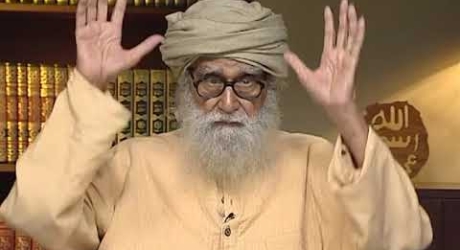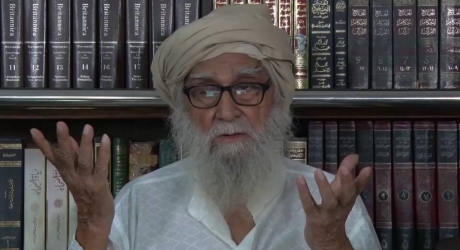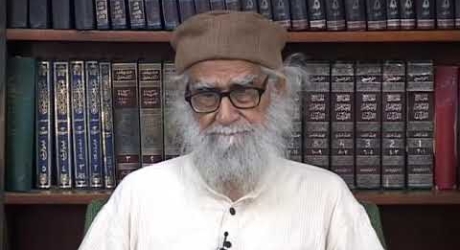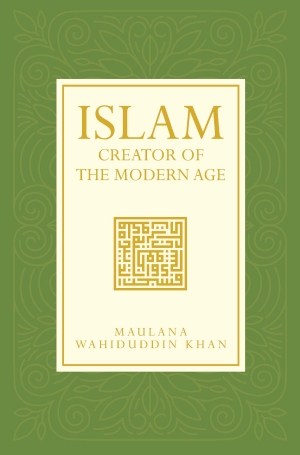Religion or faith relates to issues such as the existence of God, something unobservable, unlike non-religious things like the sun, which are observable. Earlier, the direct or rational argument was possible only in non-religious matters, and so far as religious matters were concerned, the rational argument was not applicable as it was inferential. Later, when science advanced to the microcosmic level after the splitting of the atom in the early twentieth century, it showed beyond the shadow of a doubt that science came to support religion. This is because not only is the direct, observable argument found to be valid, but also the inferential argument, that is, the invisible sources of visible effects, are also considered valid scientific arguments by scientists. Though God cannot be seen, the effect of His creation–the universe–can always be seen by everyone. As the inferential argument is considered valid by scientists, if we believe in the existence of the universe–the effect of God's creation–we have to believe in the existence of the Creator of the universe—God Almighty. This universe is proof of belief in the existence of God.
Maulana Wahiduddin Khan presented Islam as it is in rational terms and concluded that the primary religious teachings, such as the existence of God, the Hereafter, prophethood, the veracity of the Quran, and a God-oriented understanding of the purpose of life, are as valid, understandable, and intellectually acceptable as any of the theories propounded by science. A seeker of Truth can believe in them just as he believes in other realities of life. The picture of life and the universe that shapes our minds on accepting religious truth is meaningful. This establishes the Truth of the God-centered religion—Islam—in the same way the material universe echoes in mathematical formulae.
Maulana Wahiduddin Khan gave a rational interpretation of religion by presenting Islamic concepts based on reason to address modern minds.
Featured Articles
Featured Videos
FAQs
It is through reason that man justifies his faith. Rational justification strengthens his convictions. Rational argument is thus an intellectual need of every believer. Without this, he would not be able to stand firmly by his faith. It is reason which transforms blind faith into a matter of intellectual choice.
Reason and faith are now standing on the same ground. In fact, no one can legitimately reject faith as something irrational, unless one is ready to reject the rationality of scientific theories as well.
Religion, or faith, relates to issues such as the existence of God, something intangible and unobservable, unlike non-religious things like the sun, which has a tangible and observable existence. Therefore, it came to be held that only non-religious matters might be established by direct argument, while it is only indirect or inferential argument that can be used to prove religious propositions.
It was believed, therefore, that rational argument was possible only in non-religious matters, and so far as religious matters were concerned, the rational argument was not applicable at all. That is to say, it was only in non-religious areas that primary rationalism was possible, while in religion only secondary rationalism was applicable.
So far, science had been based on the proposition that all the things it believed in, like the atom, could be directly explained. But when the atom, the smallest part of an element, was smashed, it was revealed that it was not a material entity, but just another name for unobservable waves of electrons.
This discovery demonstrated how a scientist could only see the effect of a thing and not the thing itself. For instance, the atom, after being split, produces energy that can be converted into electricity. Electricity runs along a wire in the form of a current, yet this event is not observable even by a scientist. But when such an event produces an effect, for instance, lighting up a bulb or setting a motor in motion, this effect comes under a scientist’s observation. Similarly, the waves from an X-ray machine, are not observable by a scientist, but when they produce the image of a human body on a plate, then it becomes observable.
After reaching this stage of rational argument the difference between religious argument and scientific argument ceases to exist. The problem faced earlier was that religious realities, such as the existence of God, could be proved only by inference or indirect argument. For instance, the existence of God, as a designer (cause) was presumed to exist because His design (effect) could be seen to exist. But now the same method of indirect argument has been generally held to be valid in the world of science.
Reason and faith are now standing on the same ground. In fact, no one can legitimately reject faith as something irrational, unless one is ready to reject the rationality of scientific theories as well. For, all the modern scientific theories are accepted as proven on the basis of the same rational criterion by which a matter of faith could be equally proved true. After the river of knowledge has reached this stage, there has remained no logical difference between the two.
Source: Spirit of Islam October 2016
The concept of ‘Where there is design, there is a designer’ is the greatest evidence of God, as where there is design—the universe, which is God’s creation—there has to be a Designer—God Almighty.
Nature proclaims the fact that there is one God Who, in the infinity of His Wisdom, has created and continues to sustain this universe. The very existence of the universe, with its superb organisation and immeasurable meaningfulness, is inexplicable except as having been brought into existence by a Creator—a Being with infinite intelligence—rather than by blind force.
Throughout the universe, there are countless examples of superb organisation, far surpassing even the most advanced systems of man-made machines. It is simply unthinkable that the formidably complicated system of the universe could have come into existence without a Creative Intelligence being behind it. There is something utterly irrational in refusing to believe in the Organiser of an organised universe. The human mind has thus no rational grounds for denying the existence of God. We have to concede that there is a formidable array of facts in the universe that cannot be explained unless we admit the role of a superior Mind or God Almighty.
Therefore, the choice before us is not between the universe with God and the universe without God. Rather, the real choice before us is between the universe with God and no universe at all. As we cannot opt for the proposition “No universe at all”, we are compelled to opt for the proposition, “The universe with God.”
Source: God Arises
To prove the existence of the Hereafter, we need to study its reality from a scientific point of view. Religion postulates that after death, human beings will leave this present, ephemeral world, and, on the Day of Judgment, will enter another world, which will be eternal. The present world is but a place of trial, where man, throughout his short stay, is on probation at every moment. When the time comes for the Last Reckoning, God will destroy this world and replace it with another world, created on an entirely different pattern. All human beings will then be resurrected and brought before the Almighty to be judged according to their deeds on this earth.
The greatest proof of the life hereafter is our present life, in which we must obviously believe, even if we do not accept that there is an afterlife. We should accept that if life is possible on one occasion, it is perfectly possible for it to come into existence a second time. There would be nothing very strange about the recurrence of our present experience of life. It is irrational to admit to a present occurrence of life and at the same time reject the probability of its recurrence in the future.
The advent of the life hereafter assumes a high degree of credibility when we find, astonishingly, that the actions of every human being are being instantaneously recorded at all times. The human personality manifests itself in three ways: thoughts, words, and actions. All three manifestations are being preserved in their entirety, being imprinted on a cosmic screen in such a manner as to make their precise reproduction an instant possibility. In the Hereafter, every detail of one’s life on Earth will be revealed, when the record of all our thoughts, words, and actions will be presented before God to show who opted for the path of God and who opted to follow Satan, who drew their inspiration from the angels and who trod the ways of evil. This makes life hereafter vital to the establishment of a just and equitable order. The life hereafter then becomes the greatest and most universal of all truths. When one seriously considers the fact that one will be made to stand before God Almighty on the Day of Reckoning and that God, having kept a watch over everyone, will sit in judgment then, one will become firm in one’s resolve to perform only good and right actions and to eschew all evil, in order to win God’s pleasure.
Man, by his very nature, desires a perfect world in fulfillment of his desires where he can live eternally. Paradise is the ultimate answer to this human quest. It is a vast, zero-defect, evil-free eternal universe, complete in itself. Paradise is the answer to all these problems. The concept of Paradise shows that man will find a place in the Hereafter where his desires will be fulfilled if he shows himself deserving of inhabiting it through the record of his life on Earth.
Paradise is the answer to all these problems. The concept of Paradise shows that man too will find everything that the rest of the universe has found. So while the rest of the universe is receiving what it wants today in this world itself, man will receive what he wants tomorrow in Paradise.
This scientific analysis of the Hereafter and Paradise leads one to accept them as religious truths.
Source: God Arises
Ingrained in man’s subconscious is the search for an ideal realm or Paradise where there has to be a certain standard of honesty in society. The problem is that in this present world, the accepted aim of life for a great many people is the attainment of material prosperity. Such people live a self-centred life, instead of a God-centered one. The insatiable lust for self-fulfillment leads to innumerable social evils, such as fornication, robbery, looting, fraudulence, kidnapping, treachery, terrorism, murder and, ultimately, war, which are the result of people pursuing the urgings of the ego. Inevitably, society pays the price for this. The fact that materialism has given rise to such conflict between individual aims and social purposes clearly indicates that the true purpose of human life is quite other than material pursuit.
Rather than aiming at worldly attainments, man should set himself to earning the approval of his Creator while he lives in this world of test, for this is what man’s purpose in life truly is. If he were to adopt this course, the individual and society will progress in harmony with one another.
A deep-rooted malaise of modern society is that although science and technology are progressing by leaps and bounds and are contributing magnificently to the physical well-being of man, there is a disastrously negative aspect to them in that they deny or are silent on the existence of God. While man’s body receives more and more nourishment, his soul is gradually being killed. Materially, he is pampered; spiritually, he is starved. It is this dichotomy that has proved to be the undoing of modern man. Spiritual starvation has reduced man to his present state of mental turmoil, in which he constantly seeks to satisfy his desires. Man is in conflict with himself, and the resulting disasters are plain for all to see.
The solution is for man to turn to God and to realise the true purpose of human life. For this, man needs to hold fast to belief in a Supreme Intelligence, the love of God, and the brotherhood of man, lifting himself closer to God by doing His will and accepting the responsibility of believing that we are, as God’s creation, worthy of His care. Man must live a God-oriented life, in consonance with the Creation Plan of God. He can then hope to live in eternal Paradise in the world hereafter if he is found deserving of this based on the record of his deeds.
Source: God Arises











